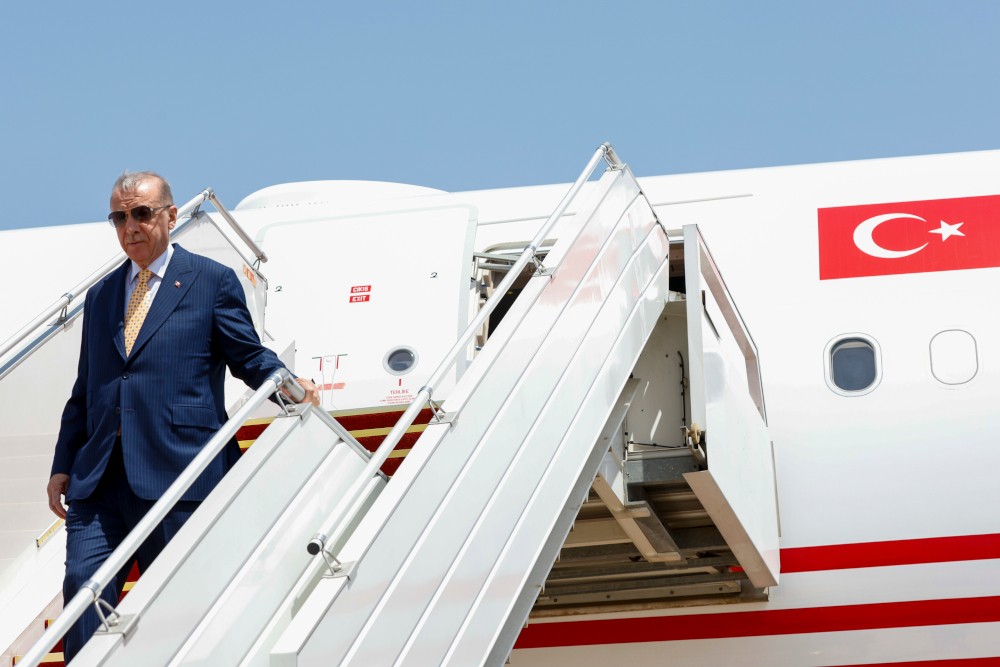
Provisions contained in letter of assurances could affect sale of fighters to Turkey and Greece: F-16s to Ankara, F-35s to Athens come with conditions

Secretary Antony J. Blinken departs Tirana, Albania, February 15, 2024. Official State Department photo by Chuck Kennedy
By LENA ARGIRI, Kathimerini – Washington
WASHINGTON – Using US military articles provided to NATO allies for “non-legitimate military purposes” could trigger the suspension or cancellation of all or part of the delivery of the equipment, according to the final draft of a letter of assurances written by the US Department of State, at the demand of the US Congress in the context of negotiations during the NATO Summit at Vilnius, Lithuania, in July 2023.
The final, July 2023, draft seen by Kathimerini, explicitly states that US defense articles provided to NATO allies must be used for legitimate military purposes and clearly must not be used to conduct military activities against other NATO allies.
As Kathimerini has repeatedly noted since the summer of 2023, the letter lays out in detail the precise process that the Department of State is to follow if a NATO member uses the defense equipment in a “contrary manner.”
- The assurance
In its letter, the Department of State provides assurances to Congress that if a NATO ally were “to conduct repeated incursions against the internationally recognized borders of another NATO ally, the United States would seek to diplomatically resolve the situation.
If the situation could not be resolved via normal diplomatic channels the United States will draw upon additional political and economic tools to resolve the situation including, if necessary, by implementing provisions in relevant defense transfer agreements with the country involved to suspend or cancel all or part of the delivery of relevant defense items consistent with the relevant provisions of those agreements.”
US diplomats do not only mention “repeated incursions” but, specifically, warn against any provocative activity by either Turkey or Greece against other NATO allies, adding that the US will use all instruments at its disposal to ensure the legitimate use of the provided equipment.
In case of non-legitimate use, the letter says that the Department of State will inform the Congressional committees involved about actions it may take. It further states that it will examine the full range of options at its disposal, including partial or total suspension or cancellation of delivery. “If we see this equipment being used in a contrary manner, we will strongly consider the full range of options available to us, including suspension or cancellation of such a case as appropriate, and will consult directly with you in advance regarding any actions we may undertake.”
Referring specifically to Greece and Turkey, the Department of State says it will consider including additional provisions in future sales aimed at “safeguarding against such activities or mistaken impressions by Turkey or Greece, that such activities are not prohibited. These measures would be implemented in a prudent method, taking into account the full scope of the United States regional policies and global defense trade posture and financial liabilities.”
It is standing US policy that defense procurement to allies will not lead to an arms race between them and will not change regional balances of power. In that respect, the draft letter states that “Consistent with the Arms Export Control Act and the administration’s Conventional Arms Transfer policy would work to ensure that defense cooperation with our allies is properly balanced and does not contribute to an arms race, increase the possibility of escalation or conflict, contribute to human rights violations or prejudice the development of bilateral or multilateral agreements or other arrangements that would benefit regional security and stability.”
Kathimerini has not seen the actual letter of assurance sent, on January 26, to the Senate Foreign Relations Committee regarding the sales of F-16 and F-35 aircraft to Turkey and Greece, respectively. But the provisions of the final draft are very likely included in it.
Kathimerini understands that similar assurance letters have accompanied arms sales to US allies among the Gulf states, but that the attachment of such a letter to sales to NATO allies is a first. When Kathimerini revealed, a few weeks ago, the existence of a letter of assurance to Congress, Turkey’s Foreign and Defense ministries issued statements denying the existence of it or any conditions posed to the sale of new F-16s and upgrade kits.
- Extra safety net
DC-based analysts say that the specific letter and the National Security Memorandum signed last week by President Biden on assurances that must be provided by every country acquiring US defense equipment and the enhanced monitoring of the final use of such equipment, create an extra safety net for Greek interests.
This letter was written in the summer of 2023 when it seemed that Sweden’s entry into NATO would be finalized at the Vilnius Summit. Congress was asking for assurances that, in case the F-16 sale to Turkey was approved, the fighters would not be used against Greece. The behind-the-scenes negotiations between Congress and the administration were tough and protracted and the exact wording of the letter was subject to many amendments.
The letter was not sent last summer as the so-called package deal (that included the F-16, the F-35, and the ratification of Sweden’s NATO membership) was temporarily frozen when Turkish President Recep Tayyip Erdogan agreed on Sweden’s entry but postponed ratification for last autumn when Turkey’s Parliament would reconvene.
In the meantime, Congress leadership made it clear to the Biden administration that the letter of assurances should be a basic element of the final agreement to sell the fighters to Turkey and Greece.
Source: LENA ARGIRI, Kathimerini – Washington
Ακολουθήστε τη HELLAS JOURNAL στη NEWS GOOGLEMitsotakis: European defence industry needs to be streamlined

